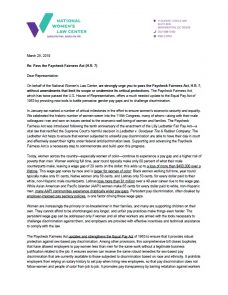Abortion rights, women of color, and LGBTQI+ people are under attack. Pledge to join us in fighting for gender justice.
On behalf of the National Women’s Law Center, we strongly urge you to pass the Paycheck Fairness Act, H.R. 7, without amendments that limit its scope or undermine its critical protections. The Paycheck Fairness Act, which has twice passed the U.S. House of Representatives, offers a much needed update to the Equal Pay Act of 1963 by providing new tools to battle pervasive gender pay gaps and to challenge discrimination.
In January we marked a number of critical milestones in the effort to ensure women’s economic security and equality. We celebrated the historic number of women sworn into the 116th Congress, many of whom—along with their male colleagues—ran and won on issues central to the economic well-being of women and families. The Paycheck Fairness Act was introduced following the tenth anniversary of the enactment of the Lilly Ledbetter Fair Pay Act—a vital law that rectified the Supreme Court’s harmful decision in Ledbetter v. Goodyear Tire & Rubber Company. The Ledbetter Act helps to ensure that women subjected to unlawful pay discrimination are able to have their day in court and effectively assert their rights under federal antidiscrimination laws. Supporting and advancing the Paycheck Fairness Act is a necessary step to commemorate and build upon this progress.
Today, women across the country—especially women of color—continue to experience a pay gap and a higher risk of poverty than men. Women working full time, year round typically make only 80 percent of what their male counterparts make, leaving a wage gap of 20 cents on the dollar; this adds up to a loss of more than $400,000 over a lifetime. This wage gap varies by race and is larger for women of color: Black women working full time, year round typically make only 61 cents, Native women only 58 cents, and Latinas only 53 cents, for every dollar paid to their white, non-Hispanic male counterparts. Latinas lose more than $1 million over a 40-year career due to the wage gap. While Asian American and Pacific Islander (AAPI) women make 85 cents for every dollar paid to white, non-Hispanic men, many AAPI communities experience drastically wider pay gaps. Persistent pay discrimination, often cloaked by employer-imposed pay secrecy policies, is one factor driving these wage gaps.
Women are increasingly the primary or co-breadwinner in their families, and many are supporting children on their own. They cannot afford to be shortchanged any longer, and unfair pay practices make things even harder. The persistent wage gap can be addressed only if women and all other workers are armed with the tools necessary to challenge discrimination against them, and employers are provided with effective incentives and technical assistance to comply with the law.
The Paycheck Fairness Act updates and strengthens the Equal Pay Act of 1963 to ensure that it provides robust protection against sex-based pay discrimination. Among other provisions, this comprehensive bill closes loopholes that have allowed employers to pay women less than men for the same work without a legitimate business justification related to the job. It ensures women can receive the same robust remedies for sex-based pay discrimination that are currently available to those subjected to discrimination based on race and ethnicity. It prohibits employers from relying on salary history to set pay when hiring new employees, so that pay discrimination does not follow women and people of color from job to job. It promotes pay transparency by barring retaliation against workers who voluntarily discuss or disclose their wages, and requiring employers to report pay data to the EEOC. And it provides for much needed training and technical assistance and research.
Women and people of color have been left behind by our economy and our policies far too often, for far too long.
Adopting the Paycheck Fairness Act would mark a vitally important step toward ensuring they can work with equality and dignity. There is no more fitting way to mark this historic Congress than by making real, concrete progress in ensuring all women receive equal pay. We urge you to prioritize the Paycheck Fairness Act in the 116th Congress by passing this important bill without amendments that compromise its critical protections. If you have any questions, please do not hesitate to contact me at [email protected] or 202-588-5180.
Sincerely,
Emily J. Martin
Vice President for Education & Workplace Justice


